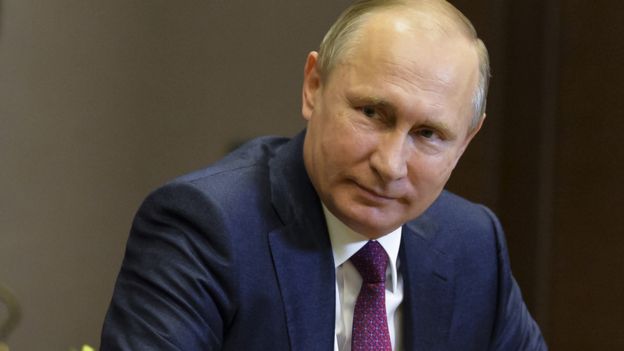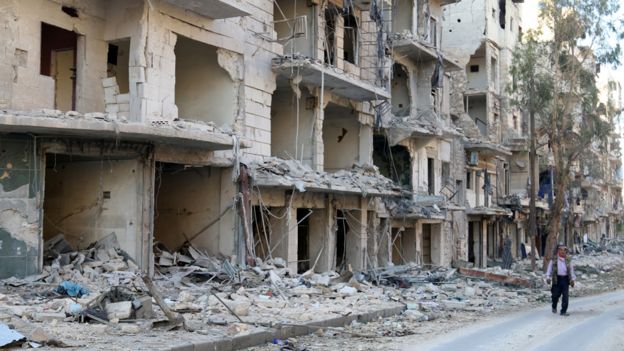T. Belman. I disagree with both DEBKA and BBC in their summations of of the policies of both Trump and Clinton, in some respects, and for what is the best policy prescription. I will give you my views on Sunday.
By Barbara Plett Usher, BBC News
 Image copyrightAP
Image copyrightAP
Who the Americans put in the White House makes a big difference to the world because US presidents have considerable power to shape foreign policy.
Think Lyndon Johnson and Vietnam; Richard Nixon and the opening to China; George Bushes Senior and Junior and their Iraq wars.
This election offers voters a real choice. Despite Donald Trump’s sometimes incoherent and seemingly improvisational approach to foreign policy, the two candidates do offer quite different visions. Hillary Clinton firmly believes the US role is to uphold a global security order from which it also benefits, the Pax Americana at the core of traditional US military and diplomatic thinking.
Donald Trump’s America First approach is more transactional. He frames alliances in business terms, vowing to get better value from them or pull back from historic commitments he says the US can no longer afford.
This is how their differences might play out in key international issues.
Nato
In no other area has Donald Trump departed more radically from decades of US foreign policy than his approach to traditional relationships. He has castigated Nato as outdated and obsolete and characterised its members as ungrateful allies who benefit from US largesse.
He says America can no longer afford to protect countries in Europe – and in Asia – without adequate compensation, suggesting he would withdraw American forces unless they pay up.
He’s also said Nato members like the Baltic states couldn’t count on the US to come to their military aid if attacked by Russia, unless they’d fulfilled their obligations.
Mr Trump is voicing longstanding criticisms. President Obama has also expressed frustration that most Nato members don’t meet their goal of spending at least 2% of GDP on defence.
But Mr Obama stands firmly by the military alliance. As does Mrs Clinton, who proclaims Nato one of the best investments America has ever made.
She’s said Mr Trump has made himself unfit for office by stepping away from Nato’s “ironclad” mutual defence commitments, and some in his own party have warned his approach could embolden Russia.
Russia
As Secretary of State Hillary Clinton was the architect of the “reset” aimed at greater co-operation with Russia, but she left office urging a harder line against President Vladimir Putin. That distrust carries over into her policy proposals to “stand up to Putin” and increase the costs of his actions.
While she acknowledges the US needs to work with Moscow where it can, she vows to partner with allies to limit its “aggression” in places like Ukraine and Syria.
She advocates strengthening Nato and improving the energy security of European states, and is willing to consider new sanctions.
In a reversal of traditional party roles, it’s the Republican Trump who has taken a more conciliatory tone to Moscow.
The real estate mogul has a history of business dealings with Russia and a number of advisers with Russian connections.
He’s said he believes he can ease tensions with Mr Putin, and has praised him as a strong leader with whom he would love to have a good relationship.
He’s said little about what this might involve beyond a desire for a joint fight against the Islamic State militants. But he intends to find out if the Russians would be “reasonable”, confident that he could better command Mr Putin’s respect than Mrs Clinton or President Obama.
Islamic State
Both candidates see so-called Islamic State as a global threat that must be defeated.
Hillary Clinton mostly adopts what President Obama is doing. Donald Trump talks tougher, vowing to “bomb the shit”out of IS and “take back the oil” from the group.
He’s also criticised the current administration for failing to use the element of surprise in attacks, especially in the campaign against the IS-held city of Mosul.
The rhetoric is different, but many of the candidates’ policy proposals sound similar.
Both talk about fighting IS with a coalition of Western and Arab states in ways the US is already doing, although they would intensify the campaign. Neither would send American combat troops to fight the group in Iraq and Syria. Donald Trump flirted with the idea at one point but seems to have dropped it.
However, he is much more willing to work with Russia in the fight against IS than Mrs Clinton, and supports harsh interrogation techniques of captured fighters, which she does not.
The candidates might also differ on what happens the day after in Mosul is captured. Mrs Clinton seems more likely to invest in fixing sectarian politics that could lead to new conflict.
Syria
Broadly speaking, Hillary Clinton is open to involvement in the civil war and Donald Trump is not.
He does support a safe zone to stop the flood of refugees but says wealthy Arab countries should set it up.
In line with US policy, defeating so-called Islamic State is a higher priority for Mr Trump than persuading Bashar al-Assad to step down.
 Image copyrightREUTERS
Image copyrightREUTERS
But he argues that the Syrian president is fighting IS, which Mrs Clinton disputes. He’s also suggested he wouldn’t back the rebels and that overthrowing Mr Assad could lead to something worse.
President Obama has similar misgivings, but covertly he does supply some rebels with some weapons and overtly he takes their side in peace talks. He also believes the Assad regime is the most destructive force in Syria and has to be replaced in order to change the environment that breeds Islamist violence. He has tried to achieve that through diplomacy but Mrs Clinton is prepared to go further.
She supports a No Fly Zone – a move that could lead to confronting Syrian and Russian warplanes. The idea would be to protect civilians and control some Syrian territory to use as leverage in a future settlement.
She might also be open to supplying heavier weapons to rebel groups. But the bottom line is that Moscow’s military involvement in Syria has severely limited options. No one wants to go to war with Russia.
Iran
The Iran nuclear deal has reduced the immediate threat of a military confrontation with the US, but the new president may struggle to see it implemented.
Hillary Clinton supports the agreement. Indeed, she laid much of the groundwork for it while she was secretary of state. But she takes a tougher tone than President Obama.
She calls her approach “distrust and verify”, promising to penalise Iran for any violations. She’s also laid out a broader strategy to confront its “bad behaviour” in the region.



Leave a Reply
You must be logged in to post a comment.